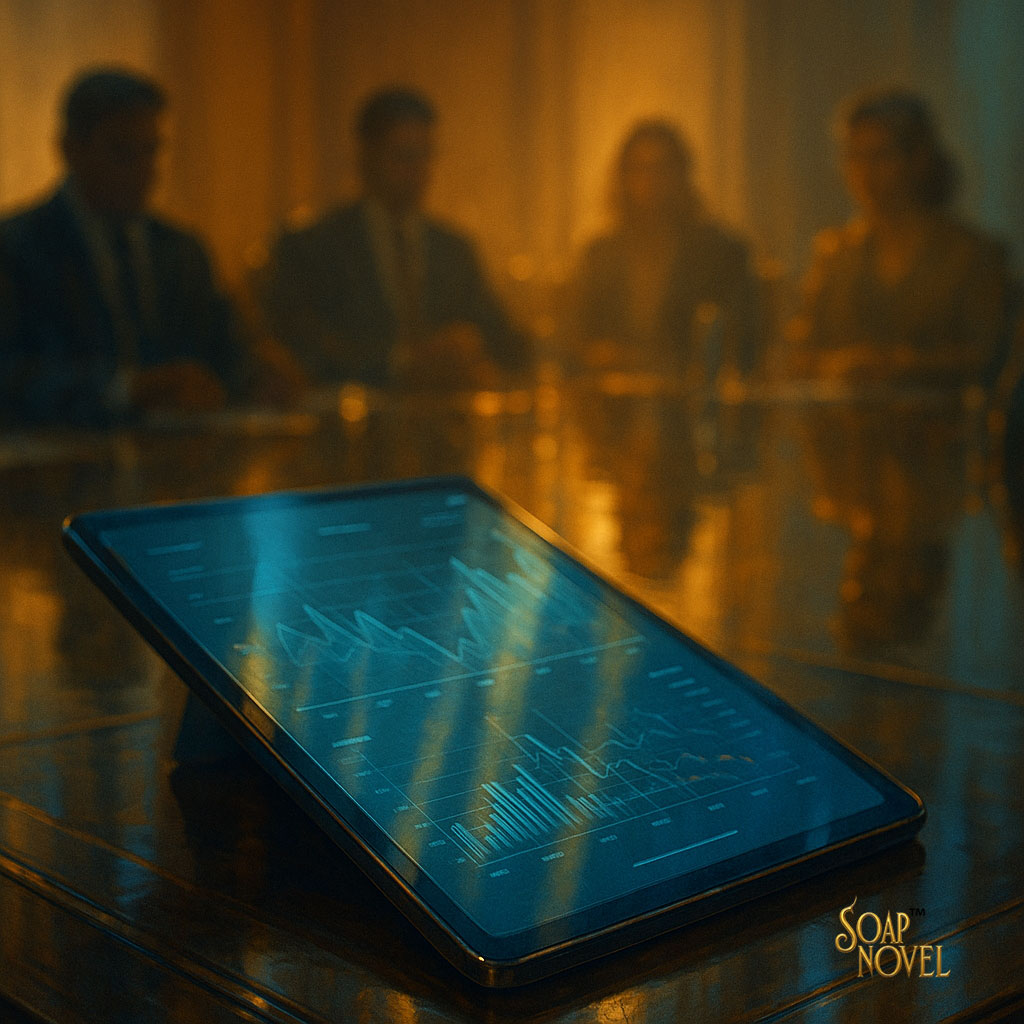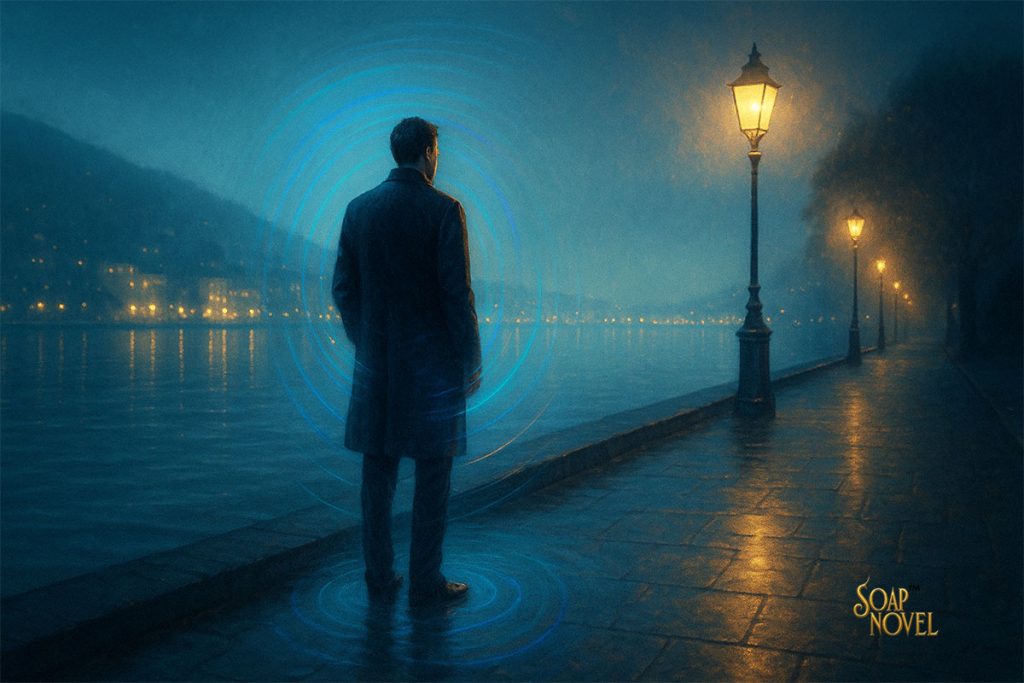Glass That Hides Sound, Not Vibration
First-time here? Start at Chaptisode 1
Published: October 21, 2025 SAST. UTC +2
The city did not announce itself. It never had to. It was the kind of place where treaties were written in rooms that had no plaques, where the lake learned to keep confidences, where glass learned to look innocent. Morning came through a pale filter, fog laid down like a polite boundary between water and stone. Inside a conference floor suspended over a view people paid to pretend they didn’t notice, four men and two women sat around a table that refused to squeak.
They were not there under any banner. No pins. No lanyards. A foundation retreat, a philanthropic convening, a private briefing—choose a name, and it would fit like a plausible alibi. What they shared was a habit: describing fear as data.
A wall display showed graphs that didn’t look afraid. A slender man with a pianist’s hands moved a line back and forth with the minimal flourish of someone rehearsed at not wasting gestures.
“You’ll see the spike,” he said, “here.” The line sprinted up, then plateaued for ninety seconds with the arrogance of a flat horizon, then sank back as if embarrassed. “Biometric, not network. We checked fiber, backbone, satellites. The grid’s clean. The bodies aren’t.”
A woman whose hair carried the discipline of a laboratory walked two fingers across the table’s edge, mapping the rhythm. “Cohort sources?”
“Unrelated,” the pianist said. “Extraction crew in the Kalahari. Night clerks in two capitals. A dormitory near Lubango. Fisheries telemetry operator on Lake Tanganyika. Control group in a Western city, unaware of the others or of themselves. If they share anything, it’s the hum.”
“Hear it?” The question was dissembled, voided of drama.
“Not hear,” he corrected. “Register. Their bodies behave as if listening costs energy.”
No one laughed. No one touched their coffee. The lake rested its cheek against the glass.
“Terminology,” another man said, gray at the edges, a financier’s plain-suit posture turned monkish in this room. “We need a word before the word chooses us.”
“Not a word,” the lab woman said. “A program.”
No one asked her to define program. In rooms like this, nouns arrive pre-armed.
The Dossier That Didn’t Ask Permission
The file did not wear insignia. It announced itself by mass alone—a narrow slab of encrypted glass, a case that locked when the fingers around it forgot who they were. When the pianist laid it down, the table accepted the weight as if it had been expecting a confession.
The first page empathized with retinas and brought text forward: Delta Window Bio-Response Summary, Rev 1.2. Below it, charts shifted with an animal patience. There were sleep patterns that had learned to wake at the same second across latitude and language. Pupil dilation curves that behaved like tide tables. Micro-tremors in calves and wrists that could have been dismissed as caffeine except the rhythms matched men who had never met, women who had never compared notes.
At the bottom of one page, a transcription box waited. The lab woman tapped it. A field report expanded, spare handwriting digitized too neatly.
Northwest relay, long-wave sweep. Ambient steady. Decibel fluctuation 0.4. Rhythm returns at twenty-nine-minute intervals. Not interference. Feels artificial. It feels like the sky is learning.
No one pretended not to feel the sentence land. The financier cleared his throat, a ceremony performed for time-buying rather than for phlegm.
“Location?” he asked.
“Proximate,” said the pianist. “A field engineer using tools we didn’t buy.”
“Authenticity?”
The lab woman looked at the graph instead of his mouth. “The hum doesn’t care about our audits.”
“We can reverse-engineer resilience,” the gray man said, a prayer phrased as policy. “Call it a wellness initiative. Adaptive. Cognitive buffering. Targets executive function under anomalous conditions without impairing normal decision-making.”
“What’s the opposite of normal?” the lab woman asked, not because she needed his answer, but because the room did.
“Whatever happens when we’re not first,” he said.
The lake slid its light a fraction along the glass. The room inhaled quietly, as if measuring whether it still owned its breath.

The First Reversal
They did not believe in stopping what had already begun to move. They believed in arriving sooner than their opponents and calling it health.
“Reversal,” the pianist said, testing the word. It sounded lovely in that accent, like a song that knew it had to carry a secret. “Not a cure. Adaptation.”
“Reversal of what?” asked the lab woman.
“Dependence,” he said. “On systems we don’t control. On senses that can be hijacked. On decision latencies measured in friction rather than in grace.”
The gray man shifted in his chair and watched how the reflection of the lake made waves move in a rectangle that pretended it was a window. “We’re not announcing this,” he said, as if the room had asked for a press release. “We’re building a cohort and a cover.”
“Call it Neuro Adaptive Wellness,” the lab woman suggested. “Make the consent process merciful.”
“Merciful?”
She folded her hands. “We keep them ignorant of the thing to which they are adapting. Ethics are cleaner if we describe the world as a stressor and not as a voice.”
The pianist’s fingers hovered over the dossier. “We will need subjects who can stand in the pulse and keep standing.”
“We already have one,” the gray man said, casual as a cut. “Trial zero. Off-protocol. Observational.”
“The hell are you doing?” the lab woman asked, the politeness of the room lending dignity to her profanity.
“Observing,” he said. “If you don’t like my verbs, you won’t like my nouns. He blinked twice during the ninety seconds. Everyone else blinked not at all or constantly. Afterward, he smiled.”
“Why?”
“I don’t know.”
The room practiced its silence with professional grace. Outside, a swan drew a letter on the lake that the glass refused to read.
Drift: Field Log, Unfiled
Across the continent, a man nobody photographed wrote in a notebook no one ordered. He had three radios on a crate and a fourth in his lap, a pencil he had learned not to chew. Behind him, a mast made the sky into a string instrument. He did not like the word technician for the same reason he didn’t like the word peasant: it pretended to know how much reality the mouth that wore it could carry.
He logged his sweep without sentiment. Long wave. Ambient steady. Decibel fluctuation 0.4. Rhythms that should not return did, politely, like a guest who refuses to take the hint.
At the margin, because margins are where truth can sit without alarming forms, he wrote the sentence he would not forgive himself for having written: It feels like the sky is learning.
Wind moved through the relay like a rumor moving through a budget. He looked up because he wanted to, not because any instrument told him. Clouds had the courtesy to behave like clouds. The ground held, and he was grateful. Two boys on a motorbike shuddered past the station, one hand on the throttle, the other on a loaf of bread. Life did not wait for the hum to publish.
He sealed the notebook in plastic that had once belonged to more important things and put it under a rock that had learned its position centuries before he was born.
Geneva Without Saying It
The gray man disliked naming cities. He preferred pronouns for places: there for the place where nothing accidental occurred, here for wherever his shoes stood. Pronouns were safer in minutes and subpoenas. So he did not say Geneva when he walked through the old arcade where the clockwork swallowed the day like a parlor trick, and he did not say lake when he descended the steps to the water line and observed, without confessing it to himself, that the air carried rhythm.

He had earbuds in because that is how modern loneliness keeps itself busy. He set the white-noise app to a channel he had been told mimicked mountain rivers. He watched the light break on ripples made by nothing he could see. He inhaled the way men inhale before speeches, then set the speech down and left it there.
The hum did not ask permission. It arrived without dramatics, like a refrigerator in a quiet kitchen asserting that it was, in fact, at work. He felt it as a pressure just behind the nose, a weight that did not argue with sinuses so much as remind them that they were tubes in a resonant instrument. On the glass of the lake, a pattern that was not quite a circle widened and then erased itself so as not to be impolite.
He listened, and in listening, he did a thing he would not have allowed in a room with minutes: he smiled, briefly and for no registered reason. The face was its own diary. Then he stopped, because discipline is the art of telling the face to behave.
Cover Stories
In the room above the water, the lab woman drew the cover story as if she had been commissioned by a museum to paint calm.
“Pilot under the umbrella of stress mitigation,” she said. “We call it a resilience study for decision-critical personnel. We collect volitional consent with minimal disclosure—no deception, only the mercy of omission. We identify outliers through standard wellness screenings. We offer them a number they cannot afford to refuse.”
“And if the hum is not a stressor but an invitation?” the pianist asked, a sin he couched as a hypothetical.
“Then we have trained them to be impolite to invitations,” she said. “Which is policy.”
“Locations?” the gray man asked.
“Distributed,” she said. “Clinics that do not call themselves clinics. Rooms inside rooms. Nothing the map can punish.”
“And the narrative?” he said.
She smiled with just enough teeth to prove she was mammal. “We tell them the sky is learning to misbehave. Our instruments will teach them to keep their manners.”
He placed his palm flat on the dossier as if swearing to something he could still exit. “For the record,” he said, to no record at all, “I am not afraid of the sky.”
“Of course not,” she said. “You brought it indoors.”
The Call That Didn’t Travel the Wires
News does not need wires when the body has learned to be antenna. In a small office where a junior officer wore a lanyard because lanyards are how buildings know who belongs, a telephone did not ring; it purred like a cat that had been taught modern etiquette. He answered because answering is the simplest obedience.
“Look to the hinge,” the voice said again, the same phrase as a week before, the same careful weight on the vowels. He did not ask who. He did not ask where. He said thank you in a tone people use for soup or for warning. He hung up and wrote hinge on a sticky note and put it behind his ID in his plastic sleeve because he did not want the word to get lost.
At a radio station where the night didn’t end so much as thin, the host cued a clip he had not described in his show notes. The caller’s voice broke the way voices do when they think they are alone. “I have friends in the capital,” the caller said. “People stopped speaking and kept standing.” The host let the silence after the sentence be the co-host. He labeled the clip Interference so the archive would be misled.
At a ministry where glass and stone made children of men, a mid-ranking aide found another no-letterhead, notepaper scrap he had not put there. They froze. And something chose. He folded it twice and ate it because sometimes the body is the only shredder one can trust.
Trial Zero
They did not call him a subject. That would have given him leverage if words ever learned to testify against their owners. They called him an observation, which is how rooms absolve themselves when the heart forgets what verbs are for.
He sat on a stool in a place without medical smell. The stool had been designed by someone who understood backs. His hands rested on his thighs and made a field of themselves. Before him, a line on a screen resolved into itself and then pretended to go away. He did not blink when the hum began—and that was, itself, the entry in a ledger no one would read aloud.
“Pain?” the lab woman asked.
“No,” he said.
“Euphoria?”
He thought of the lake shifting like breathing. He thought of the time in childhood when he had put a conch to his ear and realized a shell could house an ocean if the mind behaved. “No,” he said.
“Memory displacement?”
He did not remember wanting more than he was. He did not remember wanting less. He remembered a room in a capital where men heard and did not admit they had heard. “No,” he said.
She recorded the three letters with the respect that professionals give to syllables that carry liability away from the room. She watched his pupils fail to constrict when they should, and she felt—noted but did not record—envy. A body that does not apologize to light is a state secret worth naming a grant after.
When the ninety seconds ended, he did something unexpected. He looked at her and, without guile, smiled. It was the brief, unowned smile of someone who recognizes music before words have agreed to call it that.
“Why?” she asked, less as clinician and more as witness.
“I don’t know,” he said.
It was a perfect answer. It protected them both from knowing too soon.
The Sentence Crosses Water
The field engineer’s line made its way into other mouths with the quiet efficiency of good contraband. It arrived as a footnote in a memo that wore civility like an overcoat. It arrived in a newsletter sent to people who believed the world could be governed by bullet points with polite verbs. It arrived inside a private thread where a man in an expensive sweater asked if anyone had ever run a civilization on rumors that turned out to be true.
In the conference room above the lake that was not named, the pianist read the sentence again and found that his mouth liked the way it moved: It feels like the sky is learning. He tasted the hubris in feels, the surrender in learning. He circled the phrase without a pen.
“When the sky learns, we will be late,” he said.
“We’re never late,” the gray man replied, as if saying so turned time into a client.
“Someone else already smiled,” the lab woman said, not looking up.
“Who?” the gray man asked.
“Trial zero,” she said. “It wasn’t an emotion. It was an acknowledgment.”
“Of what?”
“Of being chosen,” she said, and closed the file as if that would diminish the word’s appetite.
Water, Glass, Face
Evening taught the lake to pretend it was a sheet of thinking metal. Lamps lit themselves along the promenade with the self-esteem of a well-run city. The gray man took his place again, earbuds ready to lie. He watched a boat that existed solely to make other boats look like they belonged. The hum reasserted itself without ceremony. His body accepted it without a vote.
Across the water, a hotel switched on five floors at once, a pattern elegant enough to be accidental. He tilted his head. The white-noise app fell away the way old theories fall when the evidence develops a personality. He thought of the word Window and did not touch it with his mouth.
He smiled again, smaller, a courtesy between strangers. It wasn’t joy. It was recognition. The lake, invited, put a second smile on his face he could not feel from the inside. In the glass of a darkened shopfront he became two men: one who planned and one who had just been planned for.
He slipped the earbuds into his pocket because ritual was unnecessary noise. The air did not change pressure. The world did not crack. Somewhere a swan decided it had other duties.
The hum washed past without claiming to be a tide. He stood there long enough to permit himself to believe that the future could sometimes arrive as patience rather than as force.
When he turned, the city let him go without pouting. The water took back its reflections as if embarrassed to have shown them.
In a field station where a notebook slept under a rock, the wind worked on the plastic wrap with the cheerful malice of time. The sentence inside did not fade. Paper, like lakes, knows how to keep confidences.
On another floor above the lake, the lab woman erased three words from a draft protocol and replaced them with First Reversal. She closed the document. She did not save. The system saved for her anyway. The system always saves for those who like to pretend they could still walk away.
She sat with her hands flat and listened to the part of the room that the minutes never record. The hum did not enter. It did not need doors.
She thought of a door anyway, one with a hinge that had learned to creak in a useful way. She thought of a word that had entered cities it was never invited to visit. She thought of a smile someone had not meant to give.
“It feels like the sky is learning,” she said aloud, private as a wish.
The glass did what glass is paid to do. It kept its face still. The lake answered for it, a wrinkle almost too polite to count.
If this story resonates with you, consider supporting the protocol with a small Bitcoin donation. Every satoshi counts in keeping the signal strong—share and enjoy!
You’re reading Anomaly State — a serialized political fiction saga.
🔗 Bitcoin Address: 3NM7AAdxxaJ7jUhZ2nyfgcheWkrquvCzRm
English
You’re reading Anomaly State — a serialized political fiction saga.
Although satirical and fictional, TrumpaPhosa carries a thread of purposeful prophecy and hidden revelation. Some readers may interpret it as a roadmap — a reflection of what is, what was, and what may yet come.
Zulu (isiZulu)
Ufunda Anomaly State — uchungechunge lwenganekwane yezepolitiki.
Nakuba kungukuhleka nokuyinganekwane, iTrumpaPhosa ithwala umqondo wokuphrofetha ngenhloso kanye nokudalulwa okufihlekile. Abanye abafundi bangakuhumusha njengemephu yomgwaqo — ukubonakaliswa kwalokho okukhona, okwedlule, nokungenzeka kusasa.
© 2025 SoapNovel Studios — Part of the SoapVerse Network. All rights reserved. 版权所有
This serialized work is protected under creative content provisions and monitored by the Protocol.
Registered for satirical transmission worldwide.


